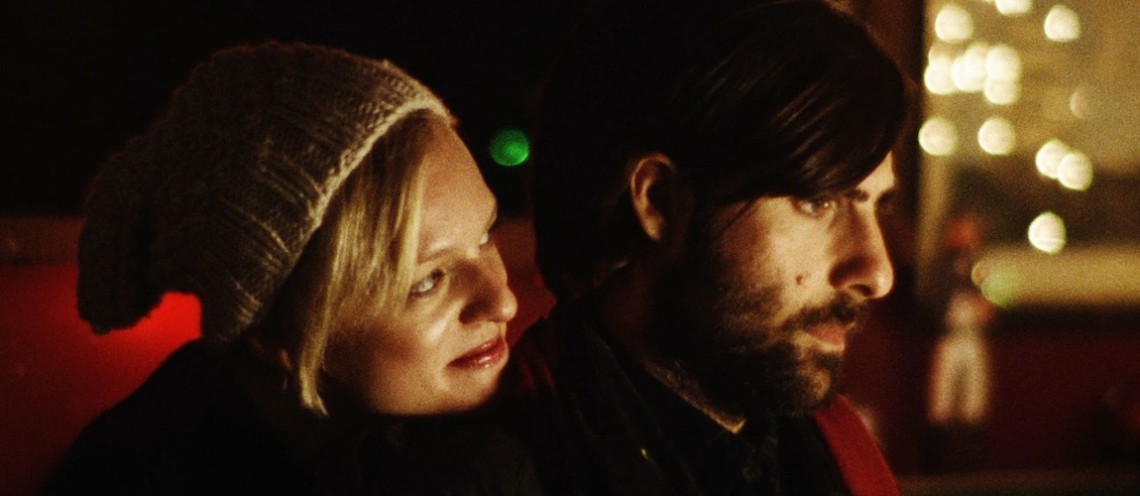What an asshole.
At not yet 35 years old, Philip Lewis Friedman (Jason Schwartzman) is about to publish his second novel. He lives in New York City with his beautiful, fashion-photographer girlfriend Ashley (Elisabeth Moss), who has supported Philip for these past two years through thick and thin. He’s earned the admiration of his peers and sparked the interest of elder idols. The bad review he’s facing in the Times doesn’t matter nearly as much as such things used to, and it looks like this surly kid “from an unsupportive background” is about to start living all his childhood dreams.
So of course, Philip has to go fuck everything up. The problem with reaching any lifelong goal (at least according to what I hear from folks who’ve actually accomplished stuff) is that you wake up the next morning and there are still dirty dishes in the sink and you’re still the same damn person you were when you started down this road in the first place. Comically unsuccessful attempts at reveling in his newfound success by making appointments to gloat in front of certain ex-girlfriends and abandoned pals result in Philip’s sad realization that none of them were exactly holding their breath waiting for him to show up again to say “I told you so.” They just weren’t thinking of him very often and his success escaped their notice because nobody really reads books anymore, anyways.
All of this happens before the opening credits. Writer-director Alex Ross Perry’s Listen Up Philip is a rueful, remarkable film about how success can still feel like defeat. I first saw it at Sundance back in January and haven’t shut up about it since. It’s funny as hell, but funny in that way where the laughs catch in your throat. I’ve watched it three times since then. This is a relentless downward spiral of a movie that finds the melancholy in misanthropy – like Llewyn Davis’ literary cousin.
Philip Lewis Friedman spends the entire picture in self-destruct mode, pushing all his private pain onto others and retreating into a calloused cocoon of his own neuroses, deliberately blowing up anything good that comes his way. Schwartzman’s casting makes it feel sometimes feel like a worst-case-scenario sequel to Rushmore — Max Fischer gone to seed, without the happy dance number ending.
Flushed with success yet still bothered by a nagging discontent, Philip sabotages everything good in his life and spurns all kindnesses save for one – an invitation from washed up icon Ike Zimmerman, a Philip Roth-ian hero famous for seminal, decades-old books like Madness & Women, Bad Eating, and Ample Profanity. (This movie beats The Royal Tenenbaums for best fake book covers.) Ike lives in seclusion upstate, isolated and alone – momentarily revived from his blocked stupor by the prospect of a protégé with similarly anti-social tendencies.
Jonathan Pryce has been very good in a great many movies, but this is something else altogether. Ike Zimmerman is a bullying lion, the king of a rapidly disappearing jungle. He takes Philip under his wing, but remains incapable of giving a compliment that doesn’t also have an insult buried in there somewhere. He’s the kind of guy who hosts a party with a bar full of Scotch and carefully doles out drinks from different bottles from different years, depending on which one he feels his guests have earned.
Ike’s also got a daughter who hates his guts. Playfully mixing around component parts from Roth’s The Ghost Writer, Perry borrows the setup and then veers off into another direction altogether. Breaking Bad’s puke-victim Krysten Ritter shows up as Zimmerman’s estranged daughter, Melanie, none too pleased to meet her Dad’s aspiring doppelganger.
The tricky thing about Listen Up Philip is that the perspectives keep shifting. Bound together with a bone-dry, novelistic third-person narration (read with magnificent aplomb by Eric Bogosian) it skips though time and follows different characters for stretches, as if you’re paging through chapters in a book.
So just when you’re getting used to a one-man-show of Schwartzman’s astounding assholery, the movie changes gears and follows his long-suffering girlfriend for 20 minutes or so after he’s gone, as she brokenheartedly begins a life anew without Philip. It’s a staggering performance by Elisabeth Moss. A visual artist, Ashley is denied all the show-boaty, hyper-literate dialogue supplied to the other characters and we just watch the emotions play across her anguished face — stunning work by Moss, perhaps the best of her career.
Cinematographer Sean Price Williams bobs and weaves, shooting in gloriously grainy, hand-held shallow-focus Super-16mm and always keeping the camera too close for comfort. (And when in doubt, go back to another telephoto close-up on Elisabeth Moss.) The characters and situations are so well established, editor Robert Greene can afford to cut out of scenes a couple beats early and we’ve already gotten the jokes. This is sly, smart filmmaking.
I love pretty much everything about Listen Up Philip. I love the lament for a literary culture that has gone the way of the dodo, where former giants now play unrecognized with blowsy divorcees they picked up at closing time. I love the way the movie is so gloriously and verbosely *written*, instead of letting actors make up dialogue while staring at their toes, as usually passes for indie cinema these days. I love the way Perry focuses on the women in this story, and all their sadness left in the wake of so many writerly self-abnegating clichés.
And I also love the Guns N’ Roses gag at the end. This is a great film.





















3 thoughts on ““Listen Up Philip””
Pingback: LISTEN UP PHILIP | SPLICED PERSONALITY
Pingback: BOFCA MID-WEEK ROUNDUP 10/29/14 | Boston Online Film Critics Association
Pingback: BOFCA REVIEW ROUND-UP: 10/31/2014 | Boston Online Film Critics Association